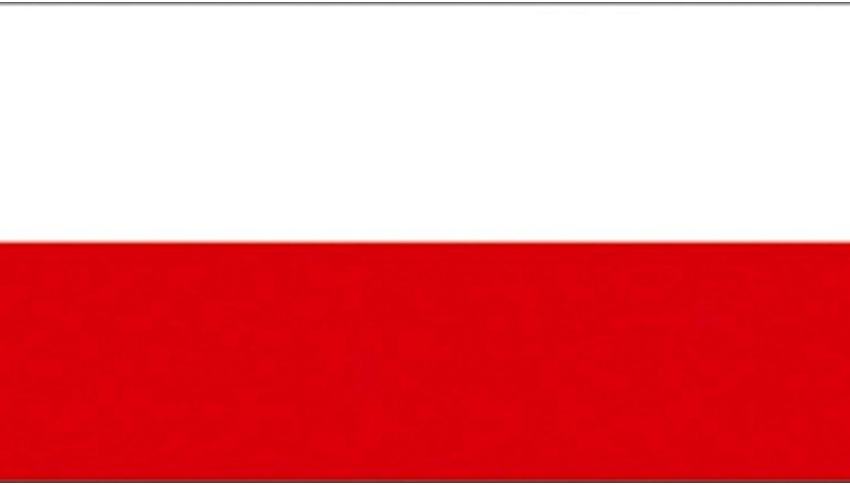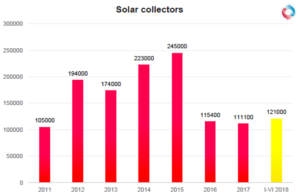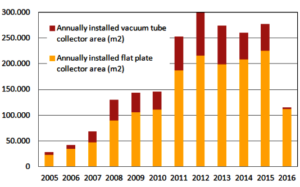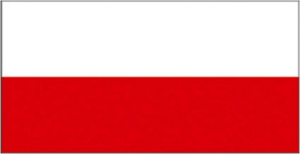Poland: Energy-Efficient Housing Subsidy Scheme Announced for 2013
December 3, 2012
High gas and coal prices – and the residential solar thermal subsidy scheme of the National Fund for Environmental Protection and Water Management (NFOŚiGW) – have so far been the main drivers of growth in the Polish solar thermal market. This, however, may change in 2013 when the new NFOŚiGW programme will start to promote energy-efficient buildings that use renewable energy sources. According to NFOŚiGW, a budget of Polish Zloty (PLN) 300 million (around EUR 75 million) will support at least 12,000 energy homes and flats over a period of five years. The programme is scheduled to start in the first quarter of 2013 and is supposed to run until the end of 2018.
The energy-efficient housing programme will offer grants of PLN 50,000 (EUR 12 500) to people who build new or renovate their old homes and whose retrofitted houses use no more than 15 kWh/m² annually from external sources of heating and electricity. Homes which use no more than 40 kWh/m² annually will receive PLN 30,000 (EUR 7,500). “Achieving such a low percentage of energy use from external sources is hardly possible without utilising energy from one’s own renewable sources,” Janusz Starościk, the President of the Association of Manufacturers and Importers of Heating Appliances, SPIUG, explains. “And considering that Polish households use 80 % of the energy for heating, solar thermal collectors and heat pumps seem to be the best way to meet these requirements,” he adds. It is not clear yet whether homeowners can apply for both the new energy-efficient housing programme and the existing residential solar water heating subsidy programme.
Smaller grants will be available for people who want to buy or modernise flats: PLN 16,000 (EUR 4,000) for flats which use no more than 15 kWh/m² annually and PLN 11,000 (EUR 2,750) for rooms which use no more than 40 kWh/m². Even if the subsidies are substantially smaller than those for single-family houses, the solar thermal industry views the programme as a possibility to serve entire blocks of flats: “This programme may create additional possibilities for solar thermal and heat pump companies to enter the multi-family building sector,” the SPUIG president hopes. The association estimates that the majority of solar thermal collectors in Poland are installed in single-family homes. This opinion is backed up by the NFOŚiGW data for the solar thermal grant programme: Of the 203,000 m² of solar thermal collectors installed since the start of the programme in September 2010, only 1,441 m² have been installed in multi-family houses, meaning 0.7 %.
The energy-efficient housing programme is only one step in the right direction for SPIUG. The Association of Manufacturers and Importers of Heating Appliances founded in 2004 has also started an initiative to draft a special Renewable Heat Law. Together with other associations, such as the Polish Heat Pump Association, called PORT PC, and Cluster 3×20, SPUIG claims that the currently discussed Renewable Energy Law mainly focuses on the renewable electricity sector. “We are keen to create regulations that support distributed heat sources through VAT and excise deductions, as well as special tariffs for electricity used by heat pumps,” describes Starościk the objective of the initiative. “We also propose to widen the gradual introduction of the obligation to install renewable heat appliances in new and modernised buildings as planned by the government,” the president explains. SPIUG thinks the draft of the renewable heat law will be presented to the Ministry of Economy in the first half of 2013.
More information
SPIUG website: http://www.spiug.pl
Marcin Czekanski is a journalist based in Szczecin, Poland, who has specialised in renewable energy.


